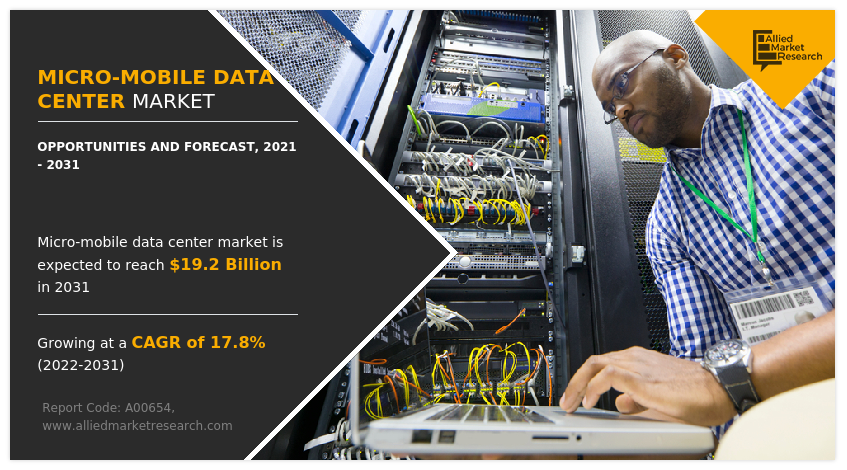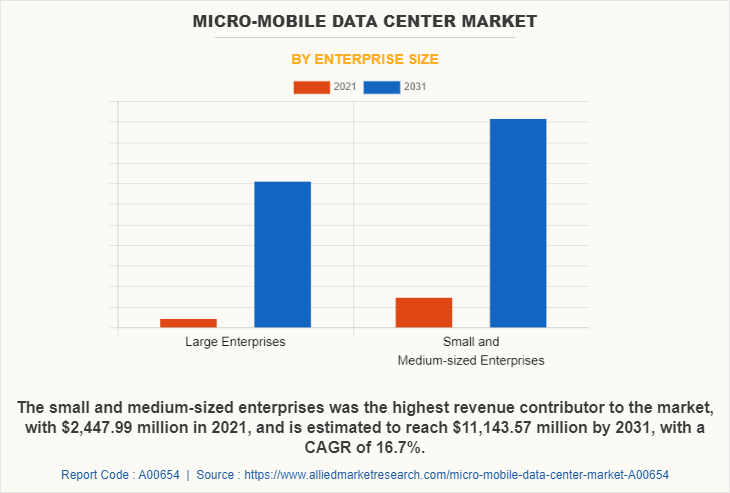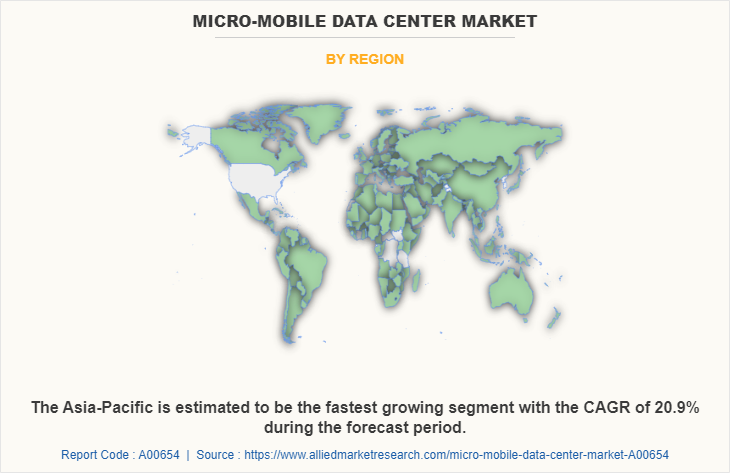Micro Mobile Data Center Market Overview
The global micro mobile data center market was valued at USD 3.9 billion in 2021 and is projected to reach USD 19.2 billion by 2031, growing at a CAGR of 17.8% from 2022 to 2031.
Factors such as the growing digitization and internet penetration in India coupled with the importance of smart technologies, IoT-powered devices, big data, and the rollout of 5G network, are expected to boost the micro mobile data center market trends. In addition, there is an increasing need for containerized data centers for corporate offices to frequently relocate their infrastructure. Furthermore, companies are investing more in micro-mobile data center expansion, due to workloads getting larger. Such factors will provide lucrative opportunities for the market growth in the upcoming years.

Moreover, businesses are increasing their presence on the cloud, requiring the use of portable data centers and increasing demand for micro mobile micro data centers SMEs enterprises, owing to low cost, and suffer less latency. Therefore, this will provide better opportunities for micro mobile data center market growth in the future. However, integration with traditional data centers hampers the growth of the micro mobile data center market.
The micro-mobile data center is a self-contained infrastructure that includes all the compute, storage, networking, power, cooling, and other modules required to run indoor and outdoor applications in a secure computing environment. Furthermore, mobile micro data centers are great for any organization that’s short on time, space, or resources. Small-scale to midsize businesses can use mobile micro data centers to support their onsite applications and services without placing too much burden on IT staff. Hence, many organizations such as IT, retail, and other sectors, are adopting micro-mobile data center due to its benefits. This factor creates lucrative growth opportunities in the micro mobile data center market during the forecast period.
Top Impacting Factors
Rising adoption of micro-mobile data center in SMEs enterprises
The need for data center infrastructure is growing among enterprises globally. However, a significant number of SMEs are incapable of making heavy investments in the construction of traditional data center facilities. When compared with these facilities, micro-mobile data centers are cost-effective, flexible, and scalable. In order to reduce cost and risk, data center designs are becoming more integrated and are being constructed from prefabricated modules that can be deployed quickly, scaled easily and operated efficiently. It takes less time to develop than traditional processes; can be repurposed at another location and easily scaled up or down depending on future needs, such benefits driving the adoption of micro-mobile data center in SMEs. Furthermore, developing markets such as China, India, and Brazil are expected to propel the growth of the micro mobile data center market. Apart from SMEs enterprises in domains such as manufacturing, retail, and banking & financial are expected to propel the growth of the market.
Rapid deployment due to cost affordable IT operations
Increased competition among the industry vertical puts restriction on the annual expenditure of the organization. The shrinking of IT budgets compels the companies to consider leasing services for their data center requirements as compared to installing in house data center facilities. Setting up an in-house data center cost proves to be a costly affair for companies, especially during the initial phase of installation.
In addition to the installation, an in-house data center requires regular operating expenditure and a high degree of care for data security and integrity. The installation and maintenance of ana data center represents a huge liability of financial and physical security for companies. This challenge is effectively addressed by micro-mobile data center. Organizations can implement micro data centers rapidly to meet changing demands while avoiding expensive infrastructure changes or data center buildouts. As micro-mobile data center provide very cost-effective operations and maintenance cost is very low; this cost affordability of micro-mobile data center is expected to drive the micro mobile data center market globally.
Increasing requirement of security, reliability and scalability of data center infrastructure
The emergence of the industrial 4.0 revolution, big data analytics, and the Internet of Things demands flexible and reliable IT resources. In addition, rise in penetration of cloud computing and rapid digitalization have led to a steady growth of the micro-mobile data center industry. Furthermore, the switch to the work-from-home and remote working increases the demand for security concern in data centers has rapidly driven the demand for micro-mobile data center. This has led to increased focus on speed to market and the ability to deploy micro-mobile data center capacity efficiently and rapidly.
The majority of downtime and system failures are caused by humans. A colocation facility that employs a team with a deep level of knowledge enabling them to choose the right mix of components can help protect infrastructure from failure. Moreover, the micro-mobile data center approaches to build SME or large-scale data centers offer both the speed to deploy as well as the quality of construction along with ease of operation. Hence, the demand for secure, reliable & scalable data centers augments the growth of the micro mobile data center market in the future.
Segment Review
The micro mobile data center market is segmented into rack unit, application, enterprise size, industry vertical, and region. By rack unit, it is bifurcated into up to 20 RU, 20 RU to 40 RU and above 40 RU. By application, it is divided into instant data center, remote office and branch office and edge computing. By enterprise size, the market is segregated into large enterprises and small and medium-sized enterprises. By industry vertical, the market is classified into BFSI, manufacturing, IT & telecom, retail, healthcare, media and entertainment, government and defense and others. Region wise, it is analyzed across North America, Europe, Asia-Pacific, and LAMEA.

Depending on the enterprise size, the small and medium-sized dominated the micro mobile data center industry in 2021 and is expected to continue this trend during the forecast period, owing to low cost, and suffer less latency. However, the large enterprises has the highest growth market share in the upcoming year. This is due to advances in technologies enabling micro-mobile data centers to transform industries worldwide, from BFSI to manufacturing, healthcare, and many others, drive the growth of the market.

By region, North America dominated the micro mobile data center market share in 2021 for the market. The increasing investment in advanced technologies such as IoT, big data, 5G and others are anticipated to provide lucrative growth opportunities for the market in North America. However, Asia-Pacific is expected to exhibit the highest growth during the forecast period. This is attributed to the increase in penetration of digitalization and higher adoption of advanced technology that propel the growth of the market in this region.
Key Strategies/Development:
For instance, in June 2022 - Microsoft signed a deal with Eaton that makes its data centers backup power supplies systems part of the electricity grid, supporting the integration of renewable energy sources. Eaton's grid ready EnergyAware UPSs can respond to control signals from the electricity utility, and offer power to the local grid, when there is an issue with supply because of peaks in demand, or troughs of supply from wind farms or solar plants.
For instance, in September 2021 - Australian micro data center firm Zella DC launched a micro data center-as-a-service offering. The new as a Service option is available for all its existing micro data centers and provides a new Opex model that provides companies the option to process more data at the Edge.
For instance, in November 2020 - Eaton, a global vendor, and provider of power management solutions formed a partnership with the Faculty of Electrical Engineering and Informatics (FER) of the University of Zagreb to develop micro data center solutions. The main goal of this collaboration is to enable data centers with one to ten racks to get more value from their IT infrastructure, at a significantly lower cost and without the complexity of traditional solutions.
Key Benefits for Stakeholders
The study provides the micro mobile data center market analysis along with the current trends and future estimations to elucidate the imminent investment pockets.
Information about key drivers, restraints, and opportunities and their impact analysis on the micro mobile data center market size is provided in the report.
The Porter’s five forces analysis illustrates the potency of buyers and suppliers operating in the micro-mobile data center industry.
The quantitative analysis of the global micro mobile data center market for the period 2021–2031 is provided to determine the micro mobile data center market potential.
Micro-Mobile Data Center Market Report Highlights
| Aspects | Details |
| Market Size By 2031 | USD 19.2 billion |
| Growth Rate | CAGR of 17.8% |
| Forecast period | 2021 - 2031 |
| Report Pages | 501 |
| By Rack Unit |
|
| By Application |
|
| By Enterprise Size |
|
| By Industry Vertical |
|
| By Region |
|
| Key Market Players | Schneider Electric, Eaton Corporation, Dell EMC Inc., Canovate Group, Zella DC, IBM Corporation, Huawei Technologies Co., Ltd., Hewlett Packard Enterprise Development LP, Cannon Technologies Ltd, Hanley Energy |
Analyst Review
The adoption of micro-mobile data center has increased over the period to provide reliable and consistent experiences for their subscribers. In addition, the ability of micro-mobile data center to provide various opportunities for businesses to gain new insights to run the business efficiently is increasing its popularity among end users. Furthermore, many healthcare, retail & e-commerce, BFSI, IT & telecom, and other industries are investing in micro-mobile data centers to increase security and reduce data center expenses in organizations, which in turn fuels the growth of the market.
Furthermore, the market is expected to witness significant growth in the future, due to increase in use of low latency networks such as long-term evolution, LTE micro stations, and 5G networks in domestic user and rise in adoption of artificial intelligence-oriented business models among organizations. Furthermore, key vendors are massively investing in micro-mobile data center to enhance customer experience. Moreover, rising demand of IoT, big data, and increasing adoption of digitalization in industries, boosts the growth of the market in the future.
On the contrary, the micro-mobile data center market will expand in response to the growth of data and digital intelligent devices, digitalization and also the government’s emphasis on digitalization. However, as data centers struggle with rising costs and increasing complexities due to rise in the adoption of mobility, big data and software designed networking, the trend towards high density environments, hyper localization, and virtualization will gain further impetus. Moreover, with increasing focus on cloud, mobility and analytics, many organizations are rethinking their data center strategies. They are evaluating data center architectures that would provide businesses the agility, flexibility and the scale desired for new application workloads. In order to reduce cost and risk, micro-mobile data center designs are becoming more integrated and are being constructed from prefabricated modules that can be deployed quickly, scaled easily and operated efficiently. It takes less time to develop than traditional processes; can be repurposed at another location and easily scaled up or down depending on future needs. For instance, developing markets such as China, India, and Brazil are expected to lead the speedy growth of the micro-mobile data center market. Thus, this is expected to provide lucrative opportunities for the market growth in the upcoming years.
The global Micro-Mobile Data Center Market was valued at USD 3.9 billion in 2021, and is projected to reach USD 19.2 billion by 2031
The global Micro-Mobile Data Center Market is projected to grow at a compound annual growth rate of 17.8% from 2022-2031 to reach USD 19.2 billion by 2031
The key players that operate in the Micro-Mobile Data Center Market such as IBM Corporation, Huawei Technologies Co., Ltd., Cannon Technologies Ltd, Schneider Electric, Dell EMC Inc., Eaton Corporation, Hanley Energy, Hewlett Packard Enterprise Development LP, Canovate Group, Zella DC
By region, North America dominated the micro-mobile data center market share in 2021 for the market.
Rising adoption of micro-mobile data center in SMEs enterprises, Rapid deployment due to cost affordable IT operations & Increasing requirement of security, reliability and scalability of data center infrastructure
Loading Table Of Content...



